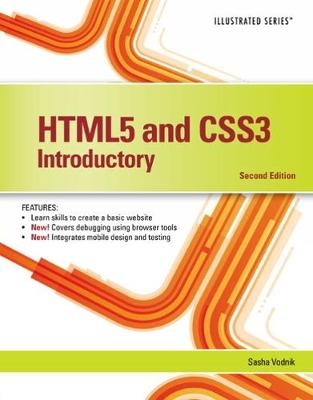
HTML5 and CSS3, Illustrated Introductory
Course Technology Inc (Verlag)
978-1-305-39405-6 (ISBN)
- Keine Verlagsinformationen verfügbar
- Artikel merken
Sasha Vodnik is a programmer, instructional designer, and trainer. They have authored or co-authored textbooks on front-end topics including HTML, CSS, and XML, and have also written and presented several online courses for advanced JavaScript developers. Sasha currently works as a technical course developer at DocuSign, where they focus on creating training materials for software developers.
Unit A: GETTING STARTED WITH HTML.
Define a Project Plan. Create Wireframes and a Storyboard. Create an HTML Document. Set Up the Document Head and Body. Add Text to a Web Page. Add a Comment to a Web Document. Preview Your Web Page on a Desktop Computer. Configure Web Server Software. Preview Your Web Page on Mobile Devices.
Unit B: STRUCTURING CONTENT IN A WEB DOCUMENT.
Evaluate Web Accessibility Standards. Incorporate Attributes. Implement the div Element. Add HTML5 Semantic Elements. Use Special Characters. Specify the Viewpoint. Debug Your HTML Code. Validate Your HTML Code. Create an XHTML Document.
Unit C: GETTING STARTED WITH CSS.
Assess Style Rules. Create an Embedded Style Sheet. Implement an ID Selector. Implement a Class Selector. Use Multiple Selectors. Create an External Style Sheet. Link to an External Style Sheet. Add a Comment to a Style Sheet. Debug and Validate CSS Code. .
Unit D: LAYING OUT ELEMENTS WITH CSS
Assess the CSS Box Model. Set Element Width and Borders. Set Margins and Padding. Align Elements with float. Controlpage flow with clear. Implement Fixed Positioning. Implement Relative Positioning. Control Stacking Order. Implement Absolute Positioning
Unit E: FORMATTING TEXT WITH CSS.. Assess Web Fonts. Declare a Font Family. Use a Custom Font. Declare Font Size and Line Height. Implement Bold and Italics. Style Pseudo-Elements. Specify Hex and RGB Colors Colors. Add Shadows. Create a Media Query.
Unit F: INSERTING AND WORKING WITH LINKS.
Understand Links. Create Relative Links. Create Absolute Links. Change CSS Display Type. Style Links with Pseudo-Classes. Style Multiple Link States. Open Links in New Tabs. Create a Link within a Document. Add Navigational Accessibility.
Unit G: INSERTING AND WORKING WITH IMAGES.
Evaluate Image File Types. Insert Images. Insert a Background Image. Mark Images as Figures. Create a Figure Caption. Use Images as Links. Create an Image Map. Define Additional Hotspots. Insert a Favicon and Touch Icons.
Unit H: ORGANIZING CONTENT WITH LISTS AND TABLES.
Create an Ordered List. Create an Unordered List. Create a Description List. Create a Navigation Bar Using a List. Insert a Table. Debug Tables. Span Columns and Rows. Format a Table with CSS. Apply a Table-Like Structure to Other Elements.
Appendix A: HTML ELEMENTS.
Appendix B: CSS PROPERTIES.
Appendix C: UPLOADING FILES TO A WEB SERVER.
Practicing Good File Management. Configuring Your FTP Client. Uploading Web Site Files.
| Verlagsort | Boston, MA |
|---|---|
| Sprache | englisch |
| Maße | 213 x 12 mm |
| Gewicht | 589 g |
| Themenwelt | Mathematik / Informatik ► Informatik ► Grafik / Design |
| Informatik ► Office Programme ► Outlook | |
| Mathematik / Informatik ► Informatik ► Web / Internet | |
| ISBN-10 | 1-305-39405-4 / 1305394054 |
| ISBN-13 | 978-1-305-39405-6 / 9781305394056 |
| Zustand | Neuware |
| Informationen gemäß Produktsicherheitsverordnung (GPSR) | |
| Haben Sie eine Frage zum Produkt? |
aus dem Bereich


